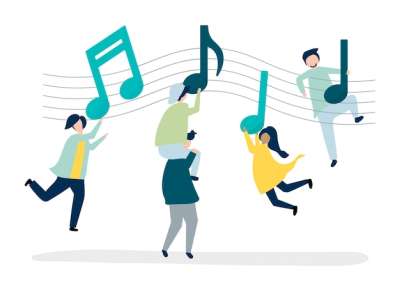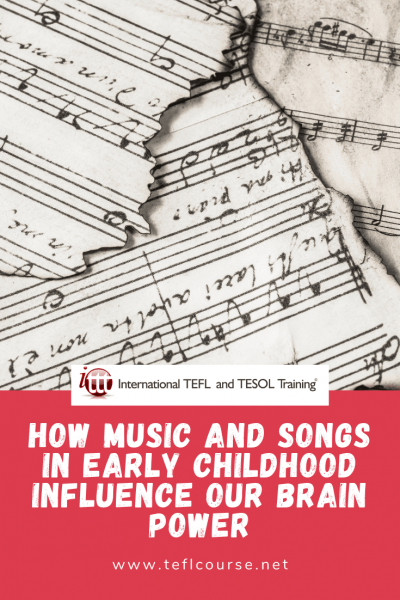How Music and Songs in Early Childhood Influence Our Brain Power

When talking about using songs in the classroom, the first things we should probably start by asking ourselves is why use them? And why are they important?
This post was written by our TEFL certification graduate Karina C. Please note that this blog post might not necessarily represent the beliefs or opinions of ITTT.
Childhood
To answer these questions, I will throw you back to your childhood for a moment, more specifically to the first five years of your life and ask you to think of this; how many things do you remember from your early childhood? Do you remember what you use to be told? Or any conversations you had with your mother/father or tutor? What about school lessons (forget about the songs here for a moment and think about ALL the rest including daily routines)?
I'm sure most of the answers to these questions will be "NO". There is a reason for this and that is a phenomenon called "childhood amnesia", which has been studied by a psychologist for ages and the cause of why this happens remains unclear. Though it could be because babies and toddlers don't have their memories fully developed yet since the hippocampus (this is the part of the brain in charge of forming memories) continues developing until at least the age of seven.

Also Read: Top Reasons Why Rules of Pronunciation are Extremely Important for Teachers
How our brain collects memories
Therefore, you might be asking yourself now, if all of this is true how can I remember songs like "row row row your boat", "twinkle twinkle little star", "five little monkeys jumping on the bed" or "Incy Wincy spider" so well after so many years even if I haven't heard them since I was a child? That is because the lyrics have their very own storage section in the brain, one that is separate from where the melody is stored. There is also the fact that you had repeated exposure to those songs, while you weren't taught fifty times the same lesson just like you didn't have the same conversation with someone fifty times.
Apart from this, you must take into consideration, that at the time you probably liked the song which helped you learn it. Furthermore, you should also take into account that, lyrics, just like swimming, riding a bike, driving or walking are a part of your motor memory, therefore, they can be recalled subconsciously with little effort.

Also Read: Do TEFL teachers need a second language?
Benefits of music and songs for the brain
Now that we have established that songs are practically the only thing we can remember from our early childhood and the reason why this happens, let’s see the benefits of songs and music in child development.
A study done by the University of South Carolina in 2016, reflected that musical experiences in childhood can accelerate brain development, particularly in the areas of language acquisition and reading skills. Music ignites all areas of child development and skills for school readiness, including intellectual, social-emotional, motor, language, and overall literacy.
It helps the body and mind work together. Exposing children to music during early development helps them learn the sounds and meanings of words. Dancing to music helps children build motor skills while allowing them to practice self-expression, plus, it helps them strengthen memory skills. In addition to the developmental benefits, music brings them joy.
Also Read: The Importance of Managing Equipment and Teaching Aids
Do you want to teach English abroad? Take a TEFL course today!
To conclude, I will quote one of my favorite philosophers of all times, Plato, who said “Music is a moral law. It gives soul to the universe, wings to the mind, flight to the imagination, and charm and gaiety to life and everything”. So, as I began this lesson with two questions I will finish it the same way but reversing one of them. After reading all this, why not use songs if they can bring us joy too while they help us make the most of our lessons? Why deprive our students of enjoying all these benefits when it’s so easy for us to provide them with them?
Apply now & get certified to teach english abroad!
Speak with an ITTT advisor today to put together your personal plan for teaching English abroad!
Send us an email or call us toll-free at 1-800-490-0531 to speak with an ITTT advisor today.
Related Articles:
- How do I get a job teaching English in South Korea
- 5 Reasons Why Teaching English Abroad Enhances Your Career Prospects
- The 10 Best Destinations for Teaching English Abroad in 2018
- Online or In-Class - Which TEFL Course Should You Take?
- The Best Government Programs For Teaching English Abroad
- What Scams to Look Out for When Looking for TEFL Jobs




